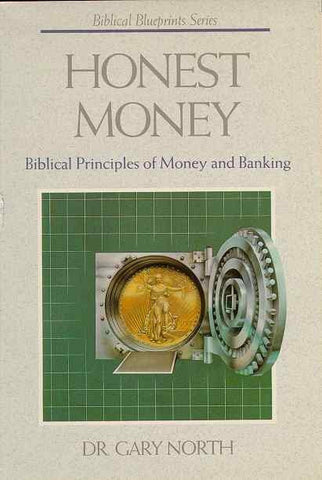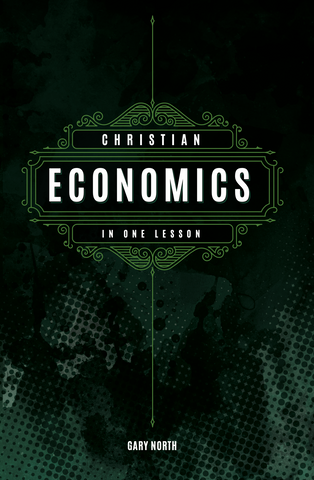For many Christians fundamentalism is viewed as a reactionary theological movement that does not offer a transformational worldview. For fundamentalism and its sister movements within the charismatic and neo-evangelical world to progress from being a flash-in-the-pan phenomenon and a cultural curiosity to being a cultural transformer with staying power, a comprehensive and long-term commitment must be made for this nation and the world in terms of kingdom principles. First the heart, then mind, and finally the world.
There are many things that can be done in the world, but if they are not done ultimately for the glory of God, it’s little more than “chasing after wind” (Eccl. 2:11, 17). Even “the wise die just like fools” (Eccl. 2:16). “Sometimes one who has toiled with wisdom and knowledge and skill must leave it all to be enjoyed by another who did not toil for it. This also is vanity and a great evil” (Eccl. 2:21).

Free PDF: Honest Money
In this volume of the ground-breaking Biblical Blueprints Series, Dr. Gary North outlines specifically what those answers are. He demonstrates beyond any shadow of a doubt that there is hope. If we act quickly, wisely, and Scripturally, we can save our nation—indeed, Western civilization—from the most disastrous economic catastrophe in history. The Bible tells us what to do: when, where, how, and why. It offers us a "blueprint" for financial victory, Honest Money lays out that "blueprint" simply, practically, and understandably. It shows us how we can "move mountains."
Buy NowSolomon had great wisdom and wealth (1 Kings 10), but he squandered all of it for power and pleasure (1 Kings 11). Andrew Carnegie was one of the richest men in the world. “After my book, ‘The Gospel of Wealth,’[1] was published, it was inevitable that I should live up to its teachings by ceasing to struggle for more wealth. I resolved to stop accumulating and begin the infinitely more serious and difficult task of wise distribution. Our profits had reached forty millions of dollars per year and the prospect of increased earnings before us was amazing. Our successors, the United States Steel Corporation, soon after the purchase, netted sixty millions in one year. Had our company continued in business and adhered to our plans of extension, we figured that seventy millions in that year might have been earned.”[2] And that’s when a million dollars was really a million dollars.
But even giving can be “chasing after wind” considering how Andrew Carnegie’s wealth is being used today. It’s even worse with the Bill and Melinda Gates Foundation’s $30 billion endowment that dominates the other richest foundations. The Carnegie Foundation isn’t even in the top 20. “According to the Philadelphia Inquirer, Pew Charitable Trusts was created on its founders’ conservative ideology and ‘Christian fundamentalist beliefs.’” Due to changes in leadership within the organization, PCT is now considered by some to have ‘increasingly liberal leanings.’”
Wealth can be a blessing and a curse. There is a warning about this in Deuteronomy 8:
For the LORD your God is bringing you into a good land, a land of brooks and fountains and springs that flow through the valleys and hills; a land of wheat, barley, vines, fig trees, and pomegranates; a land of olive oil and honey; a land where you will eat food without scarcity, where you will lack nothing; a land whose rocks are iron and whose hills are ready to be mined for copper. When you eat and are satisfied, you are to bless the LORD your God for the good land that He has given you. Be careful not to forget the LORD your God by failing to keep His commandments and ordinances and statutes, which I am giving you this day. Otherwise, when you eat and are satisfied, when you build fine houses in which to dwell,and when your herds and flocks grow large and your silver and gold increase and all that you have is multiplied, then your heart will become proud, and you will forget the LORD your God who brought you out of the land of Egypt, out of the house of slavery. He led you through the vast and terrifying wilderness with its venomous snakes and scorpions, a thirsty and waterless land. He brought you water from the rock of flint. He fed you in the wilderness with manna that your fathers had not known, in order to humble you and test you, so that in the end He might cause you to prosper. You might say in your heart, “The power and strength of my hands have made this wealth for me.” But remember that it is the LORD your God who gives you the power to gain wealth, in order to confirm His covenant that He swore to your fathers even to this day. If you ever forget the LORD your God and go after other gods to worship and bow down to them, I testify against you today that you will surely perish. Like the nations that the LORD has destroyed before you, so you will perish if you do not obey the LORD your God (vv. 7-20).
Dr. Gary North tells a story about how generational wealth can be a curse:
I have a friend who is a good writer [Otto Scott]. He used to write corporate biographies for a fee. He wrote a biography of a multi-millionaire entrepreneur in the oil business [The Professional: A Biography of J. B. Saunders]. I knew this entrepreneur enough to say hello to him. He was mentally sharp until the day he died, well into his eighties. Years after his death, the author called the man’s son to see if he could buy copies of the book. His own supply had run out, and there was still demand for it. The son told him that he had tossed out all copies soon after his father’s death. The author told me, “He had no interest in his father’s work. He had waited around for decades to get the inheritance.” Or, as Solomon said 3,500 years ago, “Yea, I hated all my labour which I had taken under the sun: because I should leave it unto the man that shall be after me. And who knoweth whether he shall be a wise man or a fool? Yet shall he have rule over all my labour wherein I have laboured, and wherein I have shewed myself wise under the sun. This is also vanity (Ecclesiastes 2:18-19).
One more story from Dr. North (the entire article is worth reading):
Years ago, my parents attended church with the daughter of a man who had started a highly successful regional bread company. It later was bought by a national company for a fortune. At the end of her father’s life, she told them, he had suffered a stroke. He sat in his bed, mute, waiting to die, with a Bible in his lap and a pencil in his hand. He kept circling the last three words in a verse, First Corinthians 3:12: “Now if any man build upon this foundation gold, silver, precious stones, wood, hay, stubble….” A success? Not in his own eyes at the end of his life. Money bought him no time after the stroke. In his case, his daughter did a lot of good with the money. But this did him no good.
Wealth needs to be put into biblical perspective. Kingdom building takes a lot of wisdom. The distribution and use of money demands a lot of thought. Put in the wrong hands, it can do a lot of damage. We’re seeing a lot of damage today by people who were able to build great wealth, and all the time falling into the trap that we find in Deuteronomy 8.

Christian Economics in One Lesson
The ultimate form of causation in human history is ethical: right vs. wrong. Modern economists do not share this view. In fact, it goes beyond this. They openly reject it. They proclaim economic analysis as value-free—this is self-deception. It is a variation of an ancient temptation: “Hath God said?” Yes, He has. “Thou shalt not steal.” There are negative sanctions attached to this commandment. These negative sanctions are both inherent in the economy and imposed by God on the economy. Our attention to this principle, especially in regard to intervention by the State, determines long-term economic growth or decline. It is time for Christians to be better-equipped for paying such attention.
Buy Now[1] The Gospel of Wealth (Century Company, New York, 1900).
[2] Andrew Carnegie, Autobiography of Andrew Carnegie (Boston: Houghton Mifflin, 1920), 255.

